The internet is full of conflicting information about solar energy. In particular, there's a lot of...
Going Off-Grid with Solar
Living off the grid with solar power is becoming increasingly popular, especially for those who seek energy independence and self-sustainability. However, the idea of going off the grid can be daunting, and it’s important to have accurate information before making such a significant change. Off grid solar systems are a useful source of energy for those who live off-grid full-time or want power reliably and quietly at their cabin, van, RV, boat, yurt, school bus, or even for a bike ride across Canada. After all, you can always count on the sun rising. In this pilot article of a new series of weekly pieces by The Cabin Depot, we’ll answer some of the most common questions related to off-grid solar systems and help you understand the benefits and challenges of this lifestyle.
An off grid solar system offers many advantages, including reduced energy cost, complete energy independence and self-sustainability. However, in order to achieve these benefits, a reliable and efficient solar off-grid system is necessary.
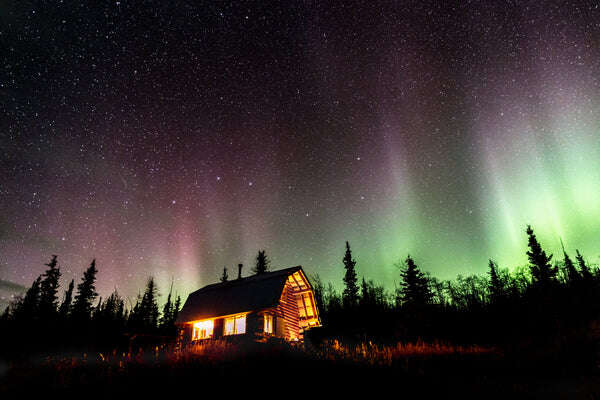
How Much Solar Power Do I Need?
The general solar array that is at least 120% of your current energy consumption. Consulting your solar supplier can also help determine the appropriate size of the solar array for your specific needs. If you're interested in receiving an estimate on your off-grid solar system, you can also complete our solar quote form here.
Off-Grid Solar Power System Components
All off-grid solar power systems are made up of four key components:
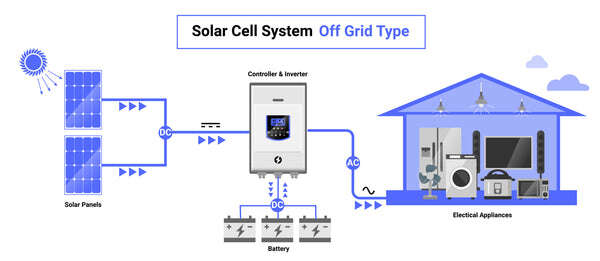
- Solar panels = converts sunlight to DC (Direct Current)
- Batteries = stores the DC energy that is produced by the solar
- Charge controller = ensures proper charging of the battery
- Inverter = converts DC energy to household 120/240vAC (Alternating Current)
People get very excited over solar panels, often rushing out to buy them first before properly sizing their system. Solar panels purchased because they are ‘on sale’ may seem like a bargain at the time, but if they aren’t the right type or size, they can actually cost you more money when finally installed. The reality is that your batteries are the most important component of an off-grid power system!
The size and type of these components will depend primarily on the electrical loads that you want to service. This can be confusing as the jargon can become more technical, but here’s the bottom line: To significantly reduce the size (and cost) of a solar power system, you will want to avoid (when possible) powering any appliances or devices used for heating or cooling air, water, and food electrically.
To learn more about off grid solar, read our Canadian's Guide to Off-Grid Living with Solar in 2023
Drawbacks of Off-Grid Solar Systems and Using Solar Off-Grid
While there are many benefits to living off-grid with solar energy, there are also some drawbacks. One of the main challenges is the high upfront cost of installation. Additionally, a larger battery bank may sometimes be required to store excess energy for times when solar production is low.
Why Use Solar?

Solar has been around since the late 1800s. We've come a long way for solar to become a feasible option for part-time, vacation, or full-time off-grid living.
Sometimes a portable all-in-one solar generator is often the most cost-effective choice for those who work off-grid or spend time at their off-grid cabin with family but don't want to listen to a generator running whenever they want to use electricity. Solar generators include inverters, charge controllers, and battery cells all in one system.
Ecoflow has an impressive line up of high-quality, smart portable power stations and solar kits that are a good entry point for learning how to harvest solar effectively.
The Cost of an Off-Grid Solar System
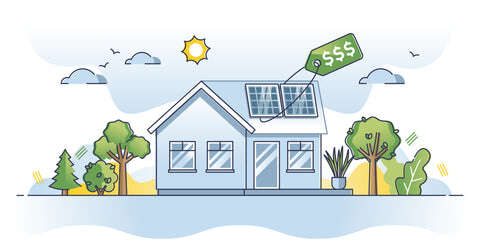
The cost of an off-grid solar system depends on several factors, including the size of the system, the type of solar panels and batteries used, and the installation and labor costs. The size of the solar system you require would entirely depend on your daily energy consumption. At The Cabin Depot, we offer a variety of off-grid solar systems at competitive prices from a wide variety of options for manufacturers, battery types, and even all-new plug-n-play modular solar kits that can be expanded up to 15kW/h of energy storage.
Just like buying a car, your budget and lifestyle will determine how much money you will eventually spend on a solar power system. And just like buying a car, there are many options and accessories available. If you want more bells & whistles, or more convenience, you’ll spend more money. It’s that simple.
Below are some examples which demonstrate the typical differences in cost:
Small system:
- Uses 12vDC battery power only (no inverter required).
- All electrical loads connect directly to the battery
- Can operate 12v LED lights, 12v water pump, 12v ceiling fans, 12v refrigerators,
- Typically used for hunting camps, weekend-use cabins, RVs, boats, yurts, vans.
- A small inverter could be added to run a TV or radio for a few hours at a time,
- Approximate cost: $350-$2000 for a complete setup.
Medium system:
- May use a 12vDC (or 24vDC battery bank with the use of a step-down converter) to power the same 12vDC devices listed in the ‘small system’ above, but adding a small inverter to supply 120vAC power for small AC loads such as radios, TV’s, DVD players, cell phone chargers, CPAP machines, etc.
- Typically used in seasonal cottages, camps, or cabins where you may spend weeks at.
- Can operate solar/DC refrigerators and other appliances designed for off-grid.
- Will typically use a gas or propane generator to run larger load items as needed i.e. coffee maker, hair dryer, air conditioner, This is usually more cost-efficient vs increasing your solar system size to run these items for short periods of time. If you don’t want to use a generator, you can expect to add ~$1000+ to the system cost.
- Approximate cost: $1000-$3500 for a complete setup.
Large system:
- Uses 120vAC and/or 240vAC
- Uses 12vDC battery power only (no inverter required)
- Typically operates household electrical loads year-round
- Some exceptions, such as electric baseboard heat, electric ranges, or electric clothes washers are usually replaced with propane models.
- Northern climate off-grid houses will always have a backup gas or propane generator, used occasionally in the winter months to charge the battery bank after consecutive days of poor weather
- Approximate cost: $7500 (with careful energy management) to $25,000+ for a complete setup.
It’s important at this point to remind you again that every solar power system is as unique as the individual using it. Buying a “kit” that is too small or not expandable will leave you without power when you need it the most and limit your ability to expand. Buying a kit that’s too large for your application is just a waste of money. So, remember - BIGGER IS NOT BETTER!
Our primary goal is to ensure your off-grid solar power system is suitable for your specific application and lifestyle, so we always recommend building it for future expansion. That way you can start off with what you ‘think’ may work and add to it in the future without having to replace all of your key components or wiring. If you're interested in receiving a custom solar quote tailored to your energy needs, click here.
Can Off-Grid Solar Run Air Conditioning?
Running air conditioning on an off-grid solar system is possible, but it requires a larger solar array and battery bank to meet the increased energy demand. However, this may change soon with new technology. Ecoflow has recently released the Wave, which serves as an off-grid battery-operated heater and air conditioning unit that can be charged directly from solar. Smaller systems such as a solar powered fan can be a low-energy option that allow you to cool-off at your cabin, or on the go.
(Editors note: When I shot this quick video, I used 60fps for shooting, so the fan may look like it's spinning very slowly, but it's just due to the framerate used while shooting. I can say from experience, it does generate a decent breeze to keep the bugs away and stay cool while fishing.)
How Many Batteries Do I Need?
The number of batteries needed for an off-grid solar system depends on the daily energy consumption and the capacity of the batteries. A general rule of thumb is to have a battery bank capacity that is at least two times your daily energy consumption to stay on the safer side.
Optimizing your Solar Harvest
Angling your solar panels can improve your harvest year-round because it allows the panels to receive sunlight at a more direct angle, maximizing the amount of solar energy that they can convert into electricity. The angle of the sun changes throughout the day and throughout the year, so angling the panels can help them capture the most sunlight possible at all times. In the winter months, angling the panels towards the sun can also help them receive more sunlight during the shorter days. Overall, angling your solar panels can improve their efficiency and energy output, leading to a more productive and cost-effective solar system. The Trifecta Solar Ground mount is a unique ground mount as it is fully-expandable, easily adjustable and provide a full axis of rotation, allowing you to clear snow off your panels very easily during the wintertime.
Running an Off-Grid Cabin on Solar Power Only
It is possible to provide enough power for an house on solar power only, but it requires a properly sized solar array and battery bank. Consulting us via our solar quote form can help determine the appropriate size of the system for your specific needs.
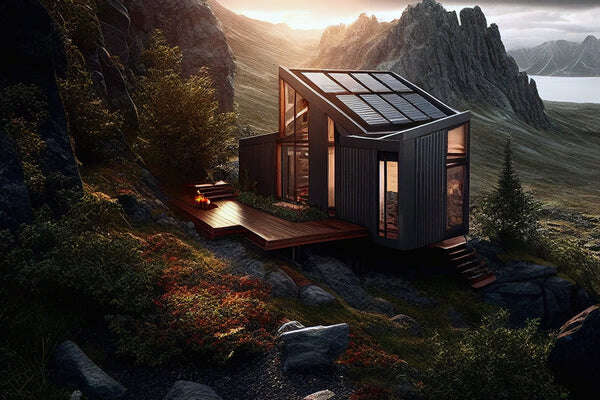
To be clear, our priority is to serve off-grid customers. We're less concerned with grid-tied solar systems and solar buy-back programs. We're not going to pretend to save you money. We're just here to state the plain: Off-grid solar works as a reliable energy harvesting method that is more cost-effective than hydro or wind systems. It is also more transportable and customizable, allowing you to enjoy energy anywhere you may wish.
Solar Panels vs. Batteries
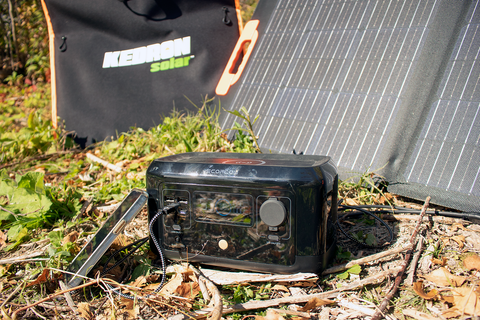
(Ecoflow River Mini with a Kedron 100w Folding Lightweight Solar Panel)
We believe it is better to have a larger solar array and fewer batteries because solar panels have a longer lifespan and are less expensive than batteries. Additionally, batteries require regular maintenance and replacement.
Conclusion
Off-grid living with solar power offers many benefits, including energy independence, reduced energy bills, and environmental sustainability. In fact, our store runs 100% on off-grid energy using the very products we serve. There are always some challenges to consider, and when you're unsure, we recommend consulting with a professional can help ensure that you have a reliable system to keep your power on without interruption.



